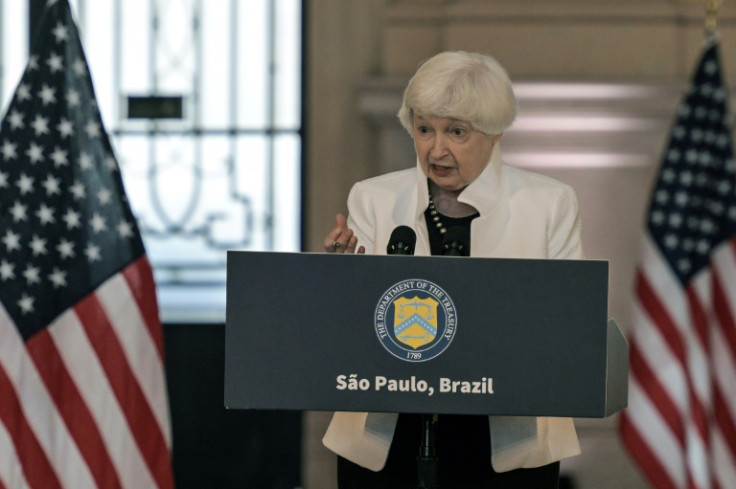
US Treasury Secretary Janet Yellen said Tuesday it was urgent for G7 nations to jointly seize profits from frozen Russian assets and redirect them to Ukraine, as the group prepared to meet on the issue.
Calls have been mounting in the United States and Europe to set up a fund for Ukraine using billions of dollars in bank accounts, investments and other assets frozen by the West over Russia's 2022 invasion.
"It is necessary and urgent for our coalition to find a way to unlock the value of these immobilized assets to support Ukraine's continued resistance and long-term reconstruction," Yellen told journalists in Sao Paulo, Brazil, where she will attend a meeting of G20 finance ministers Wednesday and Thursday.
"There is a strong international-law, economic and moral case for moving forward. This would be a decisive response to Russia's unprecedented threat to global stability. It would make clear that Russia cannot win by prolonging the war and would incentivize it to come to the table to negotiate a just peace with Ukraine."
Yellen urged joint action by the Group of Seven -- Canada, France, Germany, Italy, Japan, Britain and the United States, plus the European Union -- after evaluating the risks, which include triggering financial instability.
"The G7 should work together to explore a number of approaches: seizing the assets themselves, using them as collateral to borrow from global markets," she said.
G7 officials say the group is due to meet on the sidelines of the Sao Paulo gathering to discuss support for Ukraine, as its grueling fight against Russia enters its third year.
Ukraine has warned it desperately needs more military and financial assistance, as a fresh $60 billion US package remains stalled in Congress.
That has cast a spotlight on the estimated $397 billion in Russian assets frozen by the West, ranging from central bank assets to yachts, real estate and other property from oligarchs close to President Vladimir Putin.
But there are risks involved, including likely Russian legal action and the potential for scaring other countries, such as China, into reducing their own investments in the West, fearing similar action.
Yellen said a risk to financial stability would arise "if there were a massive shift away from currencies" of Western countries in response to seizing Russian funds. But she said the risk was minimal if the G7 acted together.
"I think (financial instability) is extremely unlikely, especially given the uniqueness of this situation, where Russia is brazenly violating international norms and a group of countries representing half the global economy... have the capacity to work together," she said.
"Realistically, there are not alternatives" to the dollar, euro and other G7 currencies on international markets, she said.
"There are risks," she acknowledged. "We're working to evaluate and outline options for consideration."
The US Congress is currently weighing a bill that would authorize the confiscation and disposition of Russian sovereign assets.
British Prime Minister Rishi Sunak called Sunday for "bolder" action on the issue, writing in an opinion piece in the Sunday Times that the West should start by taking interest from Russian assets before finding "lawful ways to seize the assets themselves."
And Greece's special envoy on Ukraine, Spiros Lampridis, told AFP Monday the EU is close to seizing Russian profits, saying it was "a question of months."
However, he added that the estimated 50 billion to 60 billion euros the move would yield was a "trifle" compared with the roughly 500 billion euros or more needed for Ukraine's reconstruction.







